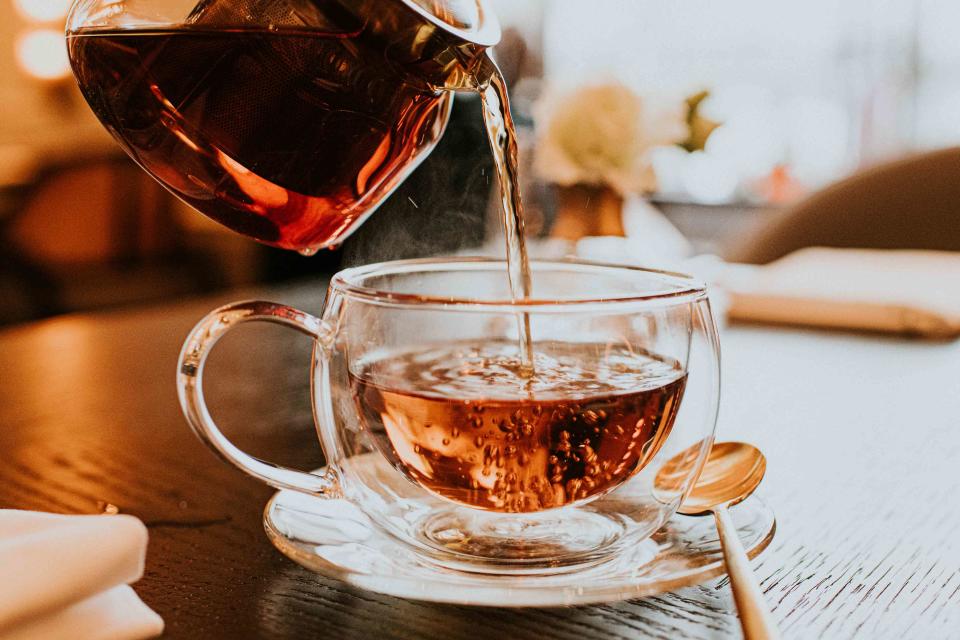Why You Should Add Salt — Yes, Salt — to Your Tea, According to a Scientist
The U.S. Embassy in London released an official statement to cool off this heated debate.

Getty
We learned back in junior high history class that Americans and Brits have quite the contentious relationship regarding tea. And as of this week, when Michelle Francl, Ph.D., a professor of chemistry at Bryn Mawr College in Pennsylvania, released her new book, she stirred the pot even more — so much so that the U.S. Embassy in London felt it necessary to step in.
So what's Francl's proposition that's making waves across the pond? That your cup of tea is missing one very important ingredient that could make it far better: A pinch of salt.
In Steeped: The Chemistry of Tea, Francl points to 8th-century Chinese manuscripts as the seed that inspired her to research. The text, Francl said, suggested stirring a bit of salt into each mug. According to Francl's analysis, the sodium in salt blocks a receptor on our tongues that tames the bitter sensation in tea, making it more pleasant to drink.
Across the pond, the staff at the The Guardian newspaper were not pleased. Declaring it an "outrageous tea recipe," they wrote that "a scientist from the country where you can find tea being made with lukewarm water from the tap claims to have found the recipe for a perfect cuppa." (In the U.K., by the way, the classically "correct" way to make tea involves pouring boiling water from a kettle into a mug, dropping in a bag of tea leaves or a tea-stepper, and allowing this to brew. A splash of milk or spoonful of sugar is optional.)
After conducting ample research on centuries of tea traditions and the latest chemical studies, Francl debuted her 240-page tome that was actually published by the U.K.'s Royal Society of Chemistry on January 24. Besides spilling the tea about her salty strategy, Francl also shares a few more tips for a better brew in that quickly-controversial book:
Add a squeeze of lemon juice to help clear up the "scum" that can occasionally form on the surface of tea when the chemicals in tea interact with the water.
Remove the lid from a to-go cup of tea to fully experience the aroma.
Dunk and squeeze the tea bag as it steeps; this can help quiet the sour sensations caused by the tannins.
To brew a perfect mug of decaf, steep the bag for 30 seconds, remove the bag from the mug, dump out the water, then add new boiling water and re-brew that bag for 5 minutes.
Related: Everything You Need to Know About Different Types of Tea
After seeing the passionate response on news and social media to the scientist's salty suggestion, The U.S. Embassy in London felt compelled to step in, sharing an official statement on X, which said, "Today's media reports of an American Professor's recipe for the 'perfect' cup of tea has landed our special bond with the United Kingdom in hot water … We want to ensure the good people of the U.K. that the unthinkable notion of adding salt to Britain's national drink is not official United States Policy. And never will be."
As for Francl, she told BBC that she "certainly did not mean to cause a diplomatic incident," adding that "my emails have been going crazy today. I did not anticipate waking up this morning to see loads of people talking about salt in their tea."
No matter where you land on this debate, and regardless of whether you're a tea newbie or tea master, Francl believes that only you can define what your own personal best cup includes.
"It is okay to experiment," she adds to BBC. "I did experiments in my kitchen for this — channel your inner scientist."
For more Food & Wine news, make sure to sign up for our newsletter!
Read the original article on Food & Wine.


